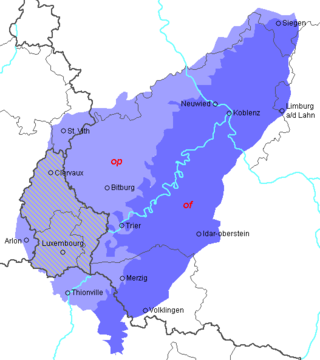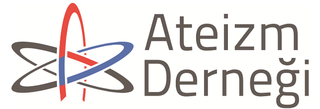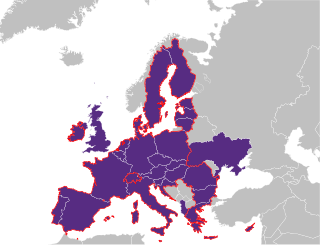
Luxembourg, officially the Grand Duchy of Luxembourg, is a small landlocked country in Western Europe. It borders Belgium to the west and north, Germany to the east, and France to the south. Its capital and most populous city, Luxembourg, is one of the four institutional seats of the European Union and the seat of several EU institutions, notably the Court of Justice of the European Union, the highest judicial authority. Luxembourg's culture, people, and languages are highly intertwined with its French and German neighbors; while Luxembourgish is the only national language of the Luxembourgish people and of the Grand Duchy of Luxembourg, French is the only language for legislation, and all three – Luxembourgish, French and German – are used for administrative matters in the country.

Luxembourgish is a West Germanic language that is spoken mainly in Luxembourg. About 400,000 people speak Luxembourgish worldwide.

Secular humanism is a philosophy, belief system or life stance that embraces human reason, secular ethics, and philosophical naturalism while specifically rejecting religious dogma, supernaturalism, and superstition as the basis of morality and decision making.

The national flag of Luxembourg consists of three horizontal stripes, red, white and light blue, and can be in 1:2 or 3:5 ratio. It was first used between 1845 and 1848 and officially adopted in 1993. It is informally called in the country, «rout, wäiß, blo».

The American Humanist Association (AHA) is a non-profit organization in the United States that advances secular humanism.

Humanist Manifesto is the title of three manifestos laying out a humanist worldview. They are the original Humanist Manifesto, the Humanist Manifesto II (1973), and Humanism and Its Aspirations. The Manifesto originally arose from religious humanism, though secular humanists also signed.
AHA, Aha, or aha may refer to:

The Happy Human is an icon that has been adopted as an international symbol of secular humanism. Created by Dennis Barrington, the figure was the winning design in a competition arranged by Humanists UK in 1965. Various forms of it are now used across the world by humanist organisations of all sizes including Humanists UK, Humanists International and The American Humanist Association (AHA).

Christianity is the largest religion in Luxembourg, with significant minorities of non-religious people and adherents of other faiths.
The Protestant Reformed Church of Luxembourg is a Protestant Reformed denomination that operates solely in Luxembourg.

The European Humanist Federation, officially abbreviated as EHF-FHE, was an umbrella of more than 60 humanist and secularist organisations from 25 European countries.

The Pirate Party Luxembourg is a registered political party in Luxembourg. The party follows the pirate political doctrine developed by the Swedish Pirate Party. It champions citizen's rights, improved data protection and privacy for physical persons, more transparency of government, free access to information and education. Beyond this, it calls for an in-depth overhaul of copyright and patent law, and opposes every form of censorship. A fundamental principle is grassroots democracy, which gives the possibility to each member to help shape the future of the party. Like most parties in Luxembourg, the Pirate Party is vigorously pro-European. It is a member of Pirate Parties International, the umbrella organisation of the international Pirate Party movement.

Kacem El Ghazzali, is a Moroccan-Swiss secularist essayist and activist and is one of the few publicly atheist Moroccans. Kacem speaks English, as well as German, French, Arabic and Berber. Mostly known for his publicly voiced atheism, his writings stress the importance of freedom of thought which, in his view is lacking in countries dominated by Islam. His articles have been published in/by the Richard Dawkins Foundation, Huffington Post, Le Monde, Neue Zürcher Zeitung, Frankfurter Allgemeine Zeitung, Basler Zeitung and others.
The secular movement refers to a social and political trend in the United States, beginning in the early years of the 20th century, with the founding of the American Association for the Advancement of Atheism in 1925 and the American Humanist Association in 1941, in which atheists, agnostics, secular humanists, freethinkers, and other nonreligious and nontheistic Americans have grown in both numbers and visibility. There has been a sharp increase in the number of Americans who identify as religiously unaffiliated, from under 10 percent in the 1990s to 20 percent in 2013. The trend is especially pronounced among young people, with about one in three Americans younger than 30 identifying as religiously unaffiliated, a figure that has nearly tripled since the 1990s.

The Party of Humanists is a minor political party in Germany that first participated in the 2017 federal election.

Ateizm Derneği is a Turkish non-profit organisation that describes itself as a freethinker association founded on 16 April 2014 for the promotion and advocacy of the concept of atheism, and serves to support irreligious people and freethinkers in Turkey who are discriminated against based on their views. Ateizm Derneği is headquartered in Kadıköy, Istanbul. As of 2019, its president is Selin Özkohen.

Taina Bofferding is a Luxembourgish politician who serves as the Minister of the Interior and of Equality between Men and Women under the Government of Xavier Bettel.
The Humanist Association of Ghana (HAG) is a humanist organization of atheists and agnostics living in Ghana who espouse humanism as a way of life, fight for the protection of human rights and promote critical thinking.

Volt Luxembourg is a political party in Luxembourg. It is an internal section of Volt Europa and was founded in 2018. It received 2.11% of the vote in the 2019 European elections, which meant that the party did not win a mandate.













